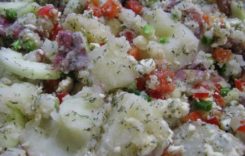
It helps us digest food better and has health benefits.
It contains a very large amount of iodine, and is especially great in a vegan diet and nutrition of those who do not use iodized salt as the source of this important mineral. The high chlorophyll content makes it an excellent watercress to improve oxygenation of the blood, as well as the functioning of red blood cells.
The kitchen is used as salads and as a condiment. Crushed leaves have a sharp smell and taste like radishes ljutkastog. The fresh leaves are used in salads. Thus prepared salad is a great side dish with roast and fried foods.
Eating watercress daily can significantly reduce DNA damage to blood cells,
The research, published in this month’s American Journal of Clinical Nutrition, found that in addition to reducing DNA damage, adaily portion of watercress also increased the ability of those cells to resist further DNA damage caused by free radicals**.
The dietary trial involved 30 healthy men and 30 healthy women (including 30 smokers) eating an 85g bag (a cereal bowl full) of fresh watercress every day for eight weeks. The beneficial changes were greatest among the smokers. This may reflect the greater toxic burden or oxidative stress amongst the smokers, as smokers were also found to have significantly lower antioxidant levels at the start of the study compared to the non-smokers.
Professor Ian Rowland, who led the research project, said: “Our findings are highly significant. Population studies have shown links between higher intakes of cruciferous vegetables like watercress, and a reduced risk of a number of cancers. However, such studies don’t give direct information about causal effects. What makes this study unique is it involves people eating watercress in easily achievable amounts, to see what impact that might have on known bio-markers of cancer risk, such as DNA damage. Most studies to date have relied on tests conducted in test tubes or in animals, with chemicals derived from cruciferous vegetables
Prof. Rowland added: “Blood cell DNA damage is an indicator of whole body cancer risk, and, the results support the theory that consumption of watercress is linked to an overall reduced risk of cancer at various sites in the body. The nature of the study group also means that the results are applicable to the general population eating a normal diet.”
The single blind, randomised, crossover study was carried out with volunteers aged between 19 and 55. The volunteers ate one daily portion of watercress in addition to their normal diet.
Source









